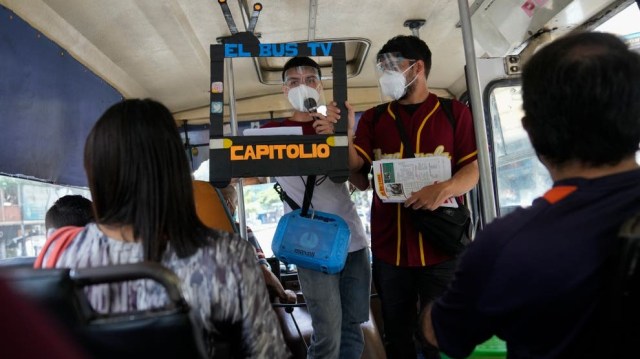
Two decades of governments that see the press as an enemy have pushed Venezuelan journalists to find alternative ways to keep citizens informed.
By Independent
Aug 3, 2021
After boarding a bus in Venezuela’s capital, Juan Pablo Lares sits in front facing the passengers, turns on a microphone and speaker, and delivers the news while a colleague holds a black cardboard frame around his face to mimic a television screen.
“Good morning! This is the newscast of El Bus TV Capitolio,” he reads from his script to the passengers, most of whom listen carefully while others brush past him to get on or off at their stops. The news he delivers is not always flattering to Venezuela’s socialist government.
That rudimentary news delivery system is one of several ways journalists are fighting to preserve press freedom in the South American nation. Media in Venezuela, like in other countries, have been struggling to stay afloat, but their difficulty is not just dwindling advertising revenue.
They face mounting pressures from a government trying to control the flow of news, including fines over criticism of officials and barriers to purchase of newsprint. This has left millions with access to information largely through state media.
“This newscast is a way to overcome censorship and misinformation in Venezuela,” Lares told his audience of passengers after his newscast one July afternoon. Stories that day included the decay of a university considered a World Heritage Site and the effects of the country’s hyperinflation.
Journalists are also giving free newspapers to bus passengers and people at bus stops, and encouraging them to share the papers with others. Other journalists are walking into neighborhoods and reading the news to people gathered around them or listening from their windows.
Since President Nicolás Maduro took office in 2013, more than 60 news outlets have closed, some of them burdened by multimillion-dollar fines imposed by a government telecommunications commission that accused them of promoting hatred and destabilization of the government.
Maduro’s actions against the press, which he accuses of conspiring against his government and spreading false information, are an extension of the tactics deployed by his predecessor and mentor, Hugo Chávez, who called independent media an enemy after taking office in 1999.
Natalie Southwick, Latin America and Caribbean program coordinator at the Committee to Protect Journalists, said Venezuela is one of the most difficult environments for the independent press as the government has used various tools – from physical harassment and detention of journalists to the use of the courts against media outlets – to make the space for critical media smaller.
“And all of this ultimately contributes to this overall goal of trying to control information, trying to control the narrative both within and outside of the country,” said Southwick. “And that’s why we see people from (President Recep) Erdogan in Turkey to someone like Maduro in Venezuela really targeting the independent press. They know that that reporting poses a threat to their ability to control what people hear and how they make decisions.”
A court in May seized the Caracas headquarters of the newspaper El Nacional, an outlet critical of Maduro and his closest collaborators. The action was the result of a defamation lawsuit filed by the vice president of the ruling party, Diosdado Cabello, and sought to guarantee a multimillion-dollar payment in damages.
That same month, the newspaper El Tiempo de Anzoátegui, in the country’s northeast, stopped printing but kept its digital edition. The nongovernmental organization Espacio Público, which documents media censorship in Venezuela, said the newspaper suspended its print edition because of hyperinflation, increased maintenance costs and a shortage of newsprint. Importing newsprint has been made difficult by the government’s tight currency controls, which have only eased recently, and the creation of a state-run monopoly to sell the paper to media companies.
Now, residents in 11 of the country’s 23 states no longer have access to regional newspapers, according to Espacio Público.
…
Read More: Independent – On the bus or off, Venezuela journalists try to deliver news
…

